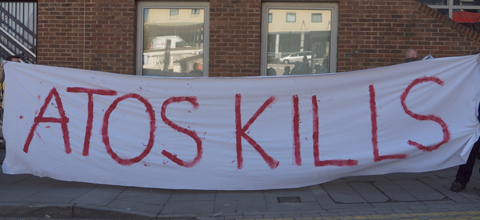It’s a bitterly cold Thursday afternoon in early November, and 32-year-old Christos Palmer is eating his first meal since Sunday. It’s only a ‘pauper’s picnic’ of some soup and bread rolls, but it’s the first substantial food he’s had in days.
Christos isn’t homeless or begging, but voluntarily choosing to starve himself as part of a protest against the cuts to disability benefits currently happening all over the country. This meagre meal marks the end of his four-day hunger strike outside the Gabalfa offices of French healthcare company Atos.
Christos began his strike after receiving a letter from the Department of Work and Pensions (DWP) telling him that despite suffering from hypothyroidism, hypertension, anxiety and depression, he had been assessed as ‘fit for work’ and would have his benefits cut. This makes him one of an estimated 500,000 people standing to lose their financial support as part of the government’s new Welfare Reform Act.
“I went on hunger strike out of sheer desperation,” says Christos. “Neither Atos nor the DWP are moved by the fact that people are dying as a result of the draconian rules that they are enacting against the disabled community.”
Although Christos was the only one to go on hunger strike, his protest was performed in partnership with Disabled People Against Cuts (DPAC), who supported him in the week-long vigil.*
Rob Marsh, the DPAC spokesperson for the vigil, said that Christos’s friends and fellow DPAC members were deeply concerned for his health during the strike: “He felt very ill on Monday, and health concerns meant that we got him eating on Thursday. We still returned to finish the week on Friday.”
In response to the vigil, Atos made a statement to the Huffington Post UK asking Christos to abandon his hunger strike: “Our trained professionals go to every effort to carry out their carefully defined role with compassion and sensitivity for the concerns and pressures that can be felt by those being assessed. Atos Healthcare joins those who have done so already in urging Mr Palmer to end his hunger strike.”
However, Christos feels that the behaviour of Atos workers can often exacerbate the conditions of those they are assessing: “I think the pressure that Atos are piling on people with these medical exams are pushing ill people towards an early grave. For those of us with high blood pressure, one of the illnesses I have and am being treated for, it can be so much that it can cause a fatal heart attack.”
Countrywide cuts
Christos is one of two million disabled people currently undergoing assessment to determine whether they are fit for work, as part of the government’s new Welfare Reform Act.
In the shake-up of welfare services, the coalition government targeted the 7% of the working-age population in the UK currently claiming benefits because they’re too ill to work; incapacity benefits currently cost the taxpayer £13 billion a year
As a result, all working age claimants are now required to undergo a Work Capability Assessment (WCA) by Atos, who then pass their recommendations on to the DWP. Since the introduction of the assessment four years ago, a third of those who were claiming incapacity benefit have been declared fit for work.
But, if the DWP’s own approximation that less than 0.5% of incapacity claims are outright fraudulent is to be believed, is the government denying financial support to those who really need it?
Getting desperate
Between January and August 2011, 32 people who the DWP had assessed as being ‘fit for work’ died every week.
The national press have reported horror stories of claimants dying days after being told by the DWP that their benefits would be cut as a result of their WCA scores: Brian McArdle, 57, died of a heart attack the day after his benefits were stopped. This prompted his 13-year-old son Kieran to write a letter to the Daily Record telling them that, “Atos need to know their changes are killing genuine people like my dad.”
Closer to home, Marilyn Blakeman, aged 58 of Barry, received a letter from the DWP telling her that she would have to take part in work-related interviews and activities to continue to qualify for financial support, despite suffering from several serious conditions that make day-to-day life extremely difficult.
Speaking to Wales Online, Marilyn said that the decision had shocked her so much that she could she could “easily have had a heart attack.”
Leigh Canham, aged 57 of Cardiff, is concerned that he will lose his flat after his benefits were cut by a third as a result of his WCA: “The effects are going to be devastating for many. I will have to pay about £70 a month for my flat out of my already depleted benefits. I don’t want to move or take in a lodger, so it looks like further hardship just to keep hold of my home.”
The overwhelming local feeling is that the government have chosen a vulnerable target in the disabled, who up until this reform were assured that their support would be permanent. But with these shocking figures, and more and more people like Christos resorting to extreme measures to get their feelings known, it’s possible that the disability cuts are simply cutting those lives short.


